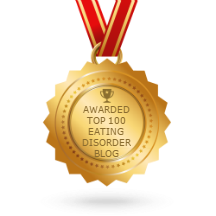- Home
- About
-
Services
- Therapy
-
Eating Disorder Trainings
>
- Clinical Approaches To Treating Body Image Issues
- Clinical Approaches To Treating Bulimia & Binge Eating Disorder
- Finding Freedom From Binge Eating
- Finding Freedom From Anorexia
- Supporting A Loved One With An Eating Disorder
- Eating Disorder Recovery Road Map
- Healing From Body Hate And Practicing Self-Compassion
- Common Questions
- Blog
- Press
- Contact
|
One of my aims in working with clients is to empower them to strengthen their “healthy self” and use it to heal their “eating disorder self.” I express to my clients that their “eating disorder self” is not bad. Rather, it is serving some kind of purpose for them. Thus, part of our work together is to uncover that purpose and determine some more life-affirming ways to get their needs met.
One important aspect of strengthening the “healthy self” is to begin to uncover or re-establish a sense of identity and purpose outside of the eating disorder. Some individuals may be reluctant to fully let go of their eating disorder, as their “eating disorder self,” tells them that it makes them “special,” and “unique.” The reality is that the deeper you are into an eating disorder, the more you become a carbon copy of everyone else who is struggling with an eating disorder. An eating disorder hijacks your true sense of self and replaces it with an illness. I guarantee that there are other traits or qualities about yourself that make you special and unique, which the eating disorder is currently masking. The following are three ways to begin to develop a sense of identity outside of your eating disorder. 1. Explore passions and hobbies that have nothing to do with food or attempting to change your body. If you have struggled with your eating disorder for a long time, it might be hard to remember what you were like before it began. Try to think back to childhood about what your passions were and what you enjoyed doing. If you’re eating disorder began in childhood, now is the time to truly discover your passions and interests, outside of food and exercise. You could start by checking out resources in your local community and challenging yourself to try one new activity a month. For instance, maybe there is a local theatre or art class that looks fun. You could try your hand at writing, learning a new language, or how to play an instrument. You won’t enjoy every new thing that you try, but the exploratory process can be part of the fun. 2. Take steps to strengthen your relationships and make new social connections. Eating disorders are truly disorders of isolation. When someone is intensely struggling, their eating disorder often becomes their primary relationship. Often people who are suffering become increasingly isolated from their family and friends. In recovery it is so important to practice turning to people when you are struggling, rather than using eating disorder behaviors. Work to strengthen existing relationships that nourish you and set boundaries with difficult people in your life. You could also begin to explore new social connections by asking a new acquaintance to get coffee or through one of the hobbies that you are pursuing. Genuine relationships are part of having a truly meaningful life. Further, having strong relationships has been shown to have a variety of benefits in terms of mental and physical health. For instance, social connections have been shown to improve health and may even increase longevity.[i] If you are struggling with your relationships, work to be compassionate with yourself. The most important thing is that you continue to reach out to others, even though it might feel scary and uncomfortable at first. However, it will get easier with time and practice. 3. Explore your values. What are the things that you truly value in your life, which the eating disorder has caused you to lose sight of? At the end of your life, it is unlikely that you will be fondly reminiscing about time spent on the treadmill or engaged in calorie counting. No one chooses to have an eating disorder. However, you can make the choice to continue on the path toward recovery. Eating disorders often serve to make someone’s world feel incredibly small. Looking at the bigger picture of life by exploring your values can be helpful in terms of your recovery and in the pursuit of developing more meaning in your life. In a book that I highly recommend on acceptance and commitment therapy, called “The Happiness Trap,” the author describes a brief exercise to begin to clarify your values. The exercise is to imagine that you are in your 80s and looking back on your life and then to answer the following questions:
You might be surprised to see what comes up after taking some time to reflect on these questions. You Deserve a Full Life You didn’t choose to have an eating disorder, but you can make the choice to continue on the path towards recovery. No matter what lies your eating disorder may be telling you, your life is worth so much more than obsessing about food and your body. Imagine all of the amazing things you could accomplish if you devoted this time and energy to something positive. Your life would truly transform. Ultimately, your worth is not found in your body size, weight, the food you eat, or how much you exercise. Your true value lies in the strength of your relationships, the way that your eyes light up with you laugh, how you pursue your passions, and in giving back to others. Living trapped in an eating disorder and having it consume your identity, is not a happy or fulfilling way to be. It may take some time, but I believe that you will uncover a newfound sense of identity and discover true meaning and purpose. Jennifer Rollin, MSW, LGSW is a psychotherapist in North Potomac, Maryland, specializing in working with adolescents, eating disorders, body-image issues, survivors of trauma, anxiety and depression. Jennifer also offers eating disorder recovery coaching for adolescents and adults in need of additional support in their recovery. Connect with Jennifer through her website at www.jenniferrollin.com. [i]http://www.health.harvard.edu/newsletter_article/the-health-benefits-of-strong-relationships
1 Comment
8/1/2018 02:25:43 pm
I really like the idea of challenging yourself to do a new activity each month. My sister has been dealing with some eating disorder problems for the past couple of years, and she is worried that she won't be able to connect with people socially again. I will be sure to reach out to her and tell her that we can try and do some activities together to expand her outlook.
Reply
Leave a Reply. |
About MeI'm an eating disorder therapist in private practice in Rockville, MD. Archives
June 2024
|


 RSS Feed
RSS Feed
